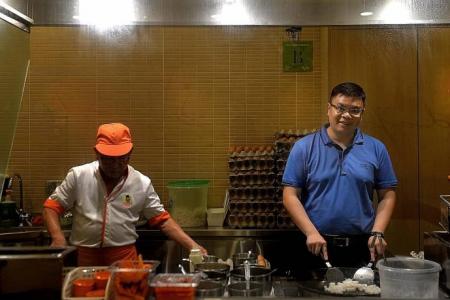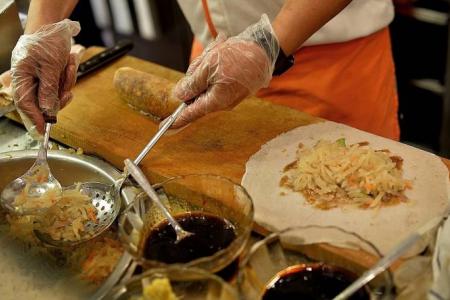Number of halal businesses here quadrupled in last 13 years
His Muslim friends used to lament that they never got to savour popular local dishes such as oyster omelette, fried carrot cake and wonton noodles.
So when Mr Tan Kim Leng, 37, started his restaurant at the Kallang Wave Mall in August, he decided to make it halal so his friends could do just that.
Encik Tan is one of four restaurants that recently received the halal certification from the Islamic Religious Council of Singapore (Muis) in the last six months.
The other three are Heavenly Wang and Japanese restaurants Ramen Ten/Shin Tokyo and Tomodachi Japanese Cafe.
"At Encik Tan, we use halal ingredients according to the terms and conditions specified by Muis, but we don't modify the food in terms of quality," says Mr Tan, who is no stranger to the Chinese food business.
"We maintain the natural characteristics and taste of all the dishes."
His family has been in the food business for decades and it was his grandfather's Redhill Teochew Fishball Noodle that started it all.
Today, the stall has grown into the Fei Siong Group, which owns food businesses like Malaysia Boleh! food court, EAT, You Tell, Hong Kong Egglet and Tangs Market.
"Only Encik Tan has the halal certificate," the father-of-three says.
His grandfather's original stall still stands in Redhill Close and is now run by an uncle.
"We continue to serve our well-loved homemade fishballs, made according to my grandfather's recipe. Only 100 per cent yellowtail fish is used," he proudly adds.
Mr Tan has to get his supplies from sources approved by Muis.
"There is a limited number of suppliers that are halal-certified, so my expenses have risen by between 10 and 20 per cent," he says, but declines to give absolute numbers.
"Fortunately, this is offset by the increase in customers coming to feast at Encik Tan.
"With the halal certification, our clientele went up by 30 per cent."
Seeing how Encik Tan is popular with Malay families, Mr Tan is making plans to open another outlet "within the community".
He reveals that the second Encik Tan will be at the 1KM Mall, on the site of former Lion City Hotel in Geylang.
She serves dimsum, builds prayer room

HER OWN RECIPES: Madam Sylvia Ler (above) serves halal dimsum at Tang Tea House in Bedok Road.

Tang Tea House
She wanted to break into the halal market with dimsum.
An unusual choice since dimsum is usually made with copious amounts of pork.
"I thought it was an untapped market and there are delicious alternatives," says Tang Tea House's boss Sylvia Ler, 58.
That was eight years ago and that astute gamble paid off. Today, hundreds of baskets of salted-egg custard buns fly off her shelves.
Nine in 10 of the customers of the restaurant in Bedok Road are Muslims, and they flock to the place on weekends for a dimsum treat. In fact; they have expanded from a corner coffee shop, to taking on three more units. Madam Ler says: "I wanted to introduce good Chinese food to the Malay community and what better way than the traditional dimsum fare."
The restaurant now serves more than 300 Chinese dishes, and her staff churn out the dishes that come from her own recipes.
"It is usually by word-of-mouth," says Madam Ler.
"My Malay customers come for lunch. Then they bring their families here for dinner. Their family members tell their friends and so on."
To cope with the demand, she expanded across the next three shops and even built a prayer room for her Muslim patrons and staff.
"This way, they do not have to gulp down their meals and rush to pray. They can pray here and have a leisurely lunch before going back to work," she adds.
Going halal means her expenses also go up by 10 to 20 per cent, yet she manages to keep prices at Tang Tea House "affordable for HDB heartlanders".
"For instance, our seafood hor fun, which is an all-time favourite, remains at only $4.80," Madam Ler says.
She continues to "absorb the goods and services tax and we don't charge for service either" to ensure that her restaurant remains popular in the long run.
Bringing new food adventure to Muslims

HOT: Mr Neo Siong Hoon says the all-time favourite dish of his Muslim customers is chilli crab. TNP PICTURE: JUDITH TAN
Sembawang Eating House Seafood Restaurant
The sad looks.
Mr Neo Siong Hoon, 34, and his mother could not erase them out of their minds.
"We used to operate beside Wak Hassan, the last Malay kampung mosque in Singapore," recalls the operations manager of Sembawang Eating House Seafood Restaurant.
"Many Muslims would come to the restaurant after their prayers for food and drinks. But because we were not halal, we saw them leave, hungry and disappointed."
That was why eight years ago, mother and son decided that at least one of the restaurants in their chain would be halal. They applied for halal certification when the restaurant moved into Bottle Tree Park in Sembawang.
The catering arm of the business took off at the same time.
"The halal certification makes it easier to cater for big gatherings and conferences," says Mr Neo.
"Today, our clients include Singapore General Hospital and Resort World Sentosa."
A foodie himself, Mr Neo, who started working at his mother's restaurant at the age of nine, feels that by becoming halal, Sembawang Eating House Seafood Restaurant opens up a whole new food adventure for the Muslim community.
"For example, whenever we recommend our Teochew steamed fish to Muslim customers, many will tell us it is the first time they are having their fish steamed," he says.
He says the all-time favourite dish among his Muslim customers is chilli crab.
"We cook it differently. Instead of using vinegar, we use oranges and lemons to give it a natural sour taste," he says.
Costs are higher, he concedes: "We pay about 40 cents more for each chicken."
While others say they see their clientele grow after becoming halal, Mr Neo says it is different for his eatery.
"Being halal, we don't serve pork. We don't serve liquor either," he says.
"That turned some of the Chinese customers away. But making up the shortfall are Muslim patrons and young families who don't drink."
What makes an eatery halal?
There are over 2,500eating places that have been issued halal certificates as at the end of last year.
What is halal and halal certification?
It is a religious endorsement from the Islamic Religious Council of Singapore (Muis) that the food or product of an establishment is suitable for Muslims.
In Singapore, the certification is voluntary and the halal certificate is issued for a period of one to two years.
How does an eatery apply for and use the halal logo?
The eatery submits an application to Muis, which conducts a review followed by an on-site audit to ensure that the eatery complies with the halal certification terms and conditions. These include:
■ Having a Halal Quality Management System that involves an internal monitoring procedure to ensure that food is prepared and utensils handled in a manner compliant with Islamic requirements.
■ Making sure halal and non-halal food or ingredients are separated and clearly marked.
■ Ensuring all ingredients used are halal and approved by Muis.
■ Going for training on Muis halal certification requirements.
■ Employing at least two Muslim staff to endorse all incoming raw materials.
How does an eatery maintain its halal certification?
Following the issuance of the certificate, Muis conducts surprise checks to ensure that the restaurant complies with the terms and conditions of the certificate at all times.
Should there be a breach, Muis will either issue a warning letter or suspend the halal certificate.
Muis also conducts surveillance inspections at public eating places to ensure that the Muis halal certification mark is not misused.
Source: Muis
Get The New Paper on your phone with the free TNP app. Download from the Apple App Store or Google Play Store now





